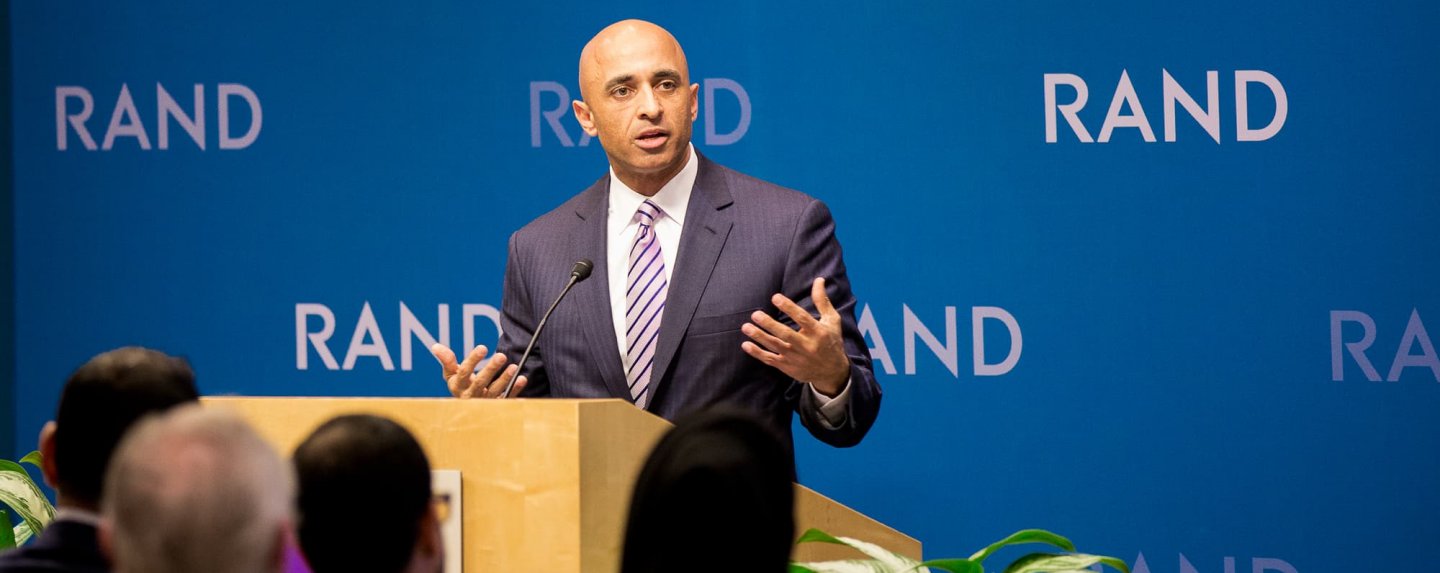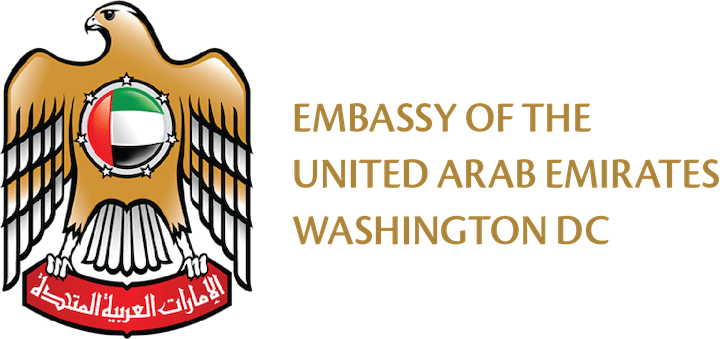
Ambassador Yousef Al Otaiba Discusses Regional Security and the US-UAE Partnership at the RAND Corporation
June 3, 2016
1 June 2016 – Speaking at the RAND Corporation in Santa Monica, California, UAE Ambassador Yousef Al Otaiba discussed the UAE’s efforts to counter extremists and confront Iranian interference in Yemen and throughout the region. He also highlighted the deep security partnership between the UAE and the US, and emphasized the importance of America’s ongoing commitment to its allies in the Middle East. The Ambassador underscored the UAE’s efforts to offer a new vision for the region that is based on tolerance, openness, opportunity and innovation.
See below to read Ambassador Al Otaiba's full remarks as prepared for delivery.
Thank you, Michael. It’s good to be here.
Today, I want to talk to you about two versions of the Middle East. There is the Middle East of conflict and grief – the one you see you a lot of on TV. And then there is the Middle East of hope and promise – the one Americans rarely hear about. This is where I want to start today.
Last week I was home to deliver the commencement address at NYU Abu Dhabi. NYU Abu Dhabi is a bold educational initiative. It’s an American-style liberal arts school in the heart of the Mideast. It is the shared vision of Sh. Mohamed bin Zayed, the Crown Prince of Abu Dhabi, and John Sexton, the former President of NYU.
To say it’s been a success is an understatement.
NYU Abu Dhabi is fast becoming the world’s honors college. This year’s graduates included 130 students from 58 countries. In just three graduating classes, it has already produced six Rhodes Scholars. An Emirati alumna is now the UAE Minister of State for Youth Affairs.
These are the world’s best and brightest. They could have attended the best schools in their own countries.
But instead they challenged tradition and opted to live and learn among the most diverse student body in the world.
In speaking at their graduation, I felt there was little I could do – or needed to do – to inspire them. Instead, I talked about how they were inspiring me. Their confidence, their curiosity, and their tolerance are truly an inspiration and a lesson for all of us.
This next generation is spreading a culture of hope – a true sense of optimism, opportunity, and openness – to a region that desperately needs it.
So that’s the good news. Now, let me talk about the two biggest dangers for both of our countries in the Mideast. The first is the threat of Al Qaeda, ISIS, and Islamic extremism. The second is the persistent threat of Iran and its escalating aggression.
In many ways, the conflict in Yemen illustrates how the UAE is meeting these dual challenges. It is a useful lens to see how the UAE is taking the fight directly to the extremists and how we are confronting the Iranians. Understanding Yemen also helps explain the importance of the close security partnership between the UAE and United States.
First a little background. In late 2014, Iranian-backed Houthi insurgents forced out the legitimate government of Yemen. The Houthis were armed, trained, and supported by Iran and their Hezbollah proxies. Tehran was not only gaining another foothold in the region, the political vacuum it created gave rise to a lawless breeding ground for AAP. Yemen was quickly spiraling downward into a Syria-like meltdown.
Finally in early 2015, at the invitation of the legitimate government of Yemen and backed with a UN mandate, a Coalition led by Saudi Arabia and the UAE took decisive action. That March, we launched air strikes against the Houthi insurgents. In July, Coalition forces linked up with local resistance fighters to retake Aden, Yemen’s second largest city, and allow for the return of the legitimate Government.
Since arriving in Aden, the Coalition has restored electricity and water, rebuilt more than a dozen clinics and hospitals, renovated 150 schools, established regular food distribution, and put tens of thousands of Yemenis back to work repairing other infrastructure. A local police and security force was recruited, trained, and equipped.
One interesting anecdote. A UAE woman military doctor, Colonel Aysha Al Dhari, was among the first group of our special forces to go ashore clandestinely in Yemen. Her mission was to discretely assess the needs of local hospitals and clinics. Her reports allowed for us to quickly restore basic health care services to the city after it was liberated some weeks later.
After taking back Aden, we then turned our attention to AQAP, Al Qaeda’s most lethal franchise. They are the terrorists responsible for the underwear bomber who almost brought down an American airliner. Its founders carried out the attack on the USS Cole in Aden. And it was AQAP who trained and dispatched the Charlie Hebdo attackers.
Over the last year, the Coalition and local Yemeni resistance fighters have systematically eliminated AQAP cells across Aden. And just six weeks ago, the Coalition drove AQAP out of Mukalla where it was making $2 million a day through taxes, smuggling, and extortion. The operation put AQAP on the run and killed more than 450 AQAP fighters.
Mike Morell, former Deputy Director of the CIA, described the operation as a "textbook solution for dealing with terrorist groups who hold territory. The loss of Mukalla is a major blow to AQAP. It is the equivalent of the Islamic State losing Mosul or Raqqa."
Routing the Houthis in Aden and AQAP in Mukalla have been important steps in helping restore the legitimate government in Yemen.
Peace talks are currently underway to bring a lasting political solution to the Yemeni people.
But to be clear, the Houthi power grab in Yemen was only possible because of direct and sustained support from Tehran and its proxy, Hezbollah. Iran relied on its Syria playbook and sent Hezbollah and IRGC trainers to assist the Houthis.
In just the last five months, the UAE, Saudi, French, Australian, and US navies have intercepted multiple ships coming from Iran carrying weapons to the Houthis.
Of course, Yemen is only one part of a broader trend of Iranian aggression across the region.
The UAE supported the nuclear deal, hoping that Iran would take the opportunity to turn over a new leaf.
But unfortunately, we remain disappointed. Behind all the talk of change, the Iran we have long known – hostile, expansionist, violent – is alive and well, and as dangerous as ever. And not just in Yemen, but throughout the region.
- The US continues to identify Iran as the leading state sponsor of terror.
- In Gaza, Iraq, Bahrain, Lebanon, among others, Iran continues to fund and arm radical and subversive groups.
- Last December, Iran fired unguided rockets dangerously close to a US aircraft carrier.
- In October, November, and again in March, Iran conducted ballistic-missile tests in violation of UN Security Council resolutions.
This aggression is not lost on the global community and certainly not among Muslims. An isolated Iran was recently denounced in a 55-1 vote in the Organization of Islamic Cooperation for its interference in the internal affairs of other states.
Iran has clearly rejected the promise of change. Instead, the Ayatollah and the IRGC have actually doubled down on their hostility throughout the region. In the UAE, we simply cannot accept this as an unfortunate reality. Rather, the international community and the US must intensify its actions to check Iran’s strategic ambitions.
All of this gives rise to important questions for America’s traditional allies in the Middle East. What can we expect from US policy in the future? How will the next American Administration manage Iran and the extremist threats that we face together?
These are the questions my bosses are asking and that’s why I came to RAND, so all of you smart people can tell me the answers I need to report home.
We do know one thing. And that is US disengagement from the region is not the answer. In fact, I can make a strong case that US disengagement will only lead to a more turbulent region.
An ongoing US commitment in the Middle East is necessary to secure the kind of future that will benefit us all.
Rest assured the UAE and other US allies in the region not only benefit from that security commitment, we contribute to it as well. We fought the Taliban in Afghanistan for 12 years, alongside our American and NATO partners. In a combined mission with the US Air Force, an Emirati women fighter pilot led the UAE’s first strike against ISIS targets in Syria. We are working with the US in Africa taking on Al Shabab.
And on the ground in Yemen, UAE service men and women are destroying Al Qaeda.
All across the region, we are on the front line protecting our – and your – shared interests and shared values.
Just as importantly, we are also on the front line promoting a new vision for young Muslims and the region – an alternative ideology, unafraid of modernity, and looking to the future.
It’s a path guided by a phrase repeated by Muslims all around the world: “In the name of God, the most merciful and most compassionate.”
Respect, inclusion, peace – these are the true tenets of Islam. Ours is an Islam that empowers women, embraces others, encourages innovation, and welcomes global engagement.
We are proud that we now have eight women ministers, one third of our entire cabinet.
Just last week, representatives from the Muslim Council of Elders visited the Bataclan Theater and other sites of the recent Paris terrorist attacks. The Council includes Islam’s most prominent, forward-thinking scholars.
It is giving greater voice to moderate Islam and modernizing the way Islam is taught in schools. It is developing new training programs for imams and updating religious commentaries. This is a UAE-led initiative.
Our vision for tomorrow is about tolerance and openness. And it’s also about opportunity and innovation.
In the UAE we are building an economic engine for the entire region, a place where the free flow of goods, services, people, investment, and ideas lifts the entire Middle East and links it to Africa, Asia, Europe, and the Americas. This also involves planning for a future that is less dependent on oil. A major step toward a sustainable post-hydrocarbon economy with the goal of increasing our use of clean energy sources to 24 percent by 2021.
Earlier this year, we opened the Cleveland Clinic Abu Dhabi – a 350 bed specialty hospital. We are building branches of the Guggenheim and the Louvre. Warner Bros. just announced its plans for a new theme park so we will soon welcome Bugs Bunny and Batman.
In Dubai, an American tech incubator, 1776, will open an office later this year.
In 2020, Dubai will host the World Expo.
And in 2021, we plan to send a space probe to Mars – the Arab world’s version of President Kennedy’s moon shot.
These initiatives create opportunities that people in the region could once only dream of. They also help to drain the energy from extremist groups and encourage kids to pick up books instead of guns.
We already have a model in the students of NYU Abu Dhabi. They give me hope that we can realize a new vision for the region and the world based on openness, opportunity, and optimism.
When I look ahead in the region, I see more Rhodes scholars and fewer terrorist recruits.
More Mars missions and fewer ballistic missiles.
More women leaders and fewer Jihadi Janes.
More online start-ups and fewer extremist websites.
An Islam of peace and inclusion, not of extremes.
In the UAE, this is our way forward.
Thank you.



